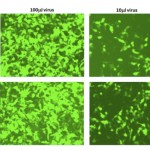Jill Muhling
I have a PhD in Molecular Virology from the University of Western Australia and have worked as a postdoc at research labs in Australia and the USA. I currently work as a Senior Scientist in the biotechnology industry in Cambridge Massachusetts. My main area of expertise is gene therapy and viral vectors, particularly vector production using different platforms.
Articles by Jill Muhling
Do you know your transfections from your transductions? We explain the differences between three of the most commonly used ways of introducing foreign DNA.
Growing up in Australia, I remember a common phrase: ‘only in America’. Sometimes this was in reference to bizarre cultural events or phenomena but it was generally accepted that the USA was an extraordinary place, where everything was bigger, brighter, and more outrageous. America has fostered a culture of big ideas and innovation, partly because…
Research isn’t easy. Not only do you deal with experimental failures and demanding supervisors, you also work with other lab members — people who are under the same pressures and stresses as you. Staff, postdocs, PhD students, and undergrads are often given bench space and a desk and encouraged to sort out the personal side…
As a researcher, it’s satisfying to manage your own projects and do the bench work yourself. After all, if you don’t have experience with a technique, you’re usually expected to figure it out (with or without direct supervision). In some situations, dealing with difficult molecular techniques is simply part of the job description. The scientific…
Viral vector production is a worthwhile skill that can be made even easier with a few tips and tricks. In general, transfection of multiple plasmids into a producer cell line results in infectious, non-replicative virus. However, it is important to ensure that your vector preparation is efficient, giving your experiments the best chance of success.…
In Part I of AAV Production, I described how to produce crude (non-purified) AAV. In this article, I am going to tell you how to purify that crude prep. Virus purification is usually done by gradient ultracentrifugation. Two common methods involve gradients made from increasing concentrations of cesium chloride or iodixanol. A cesium chloride prep…
It’s probably safe to say that most people reading this article are big fans of science. As scientists, we love using rigorous methods to learn more about how the world works. So it may come as a shock to realize that science is often viewed as flawed, immoral or just plain wrong – especially when…
What is Adeno-Associated Virus? Adeno-associated virus (AAV) is a popular gene therapy vector. Different AAV serotypes infect different cell and tissue types with varying efficiency, so it’s a good idea to select the serotype most relevant to your work. The most commonly used AAV serotypes are 1, 2, 5, 6, 8, 9 and DJ, although…
An academic lab is a unique working environment. Lab members are expected to take responsibility for their own research projects and perform the work quickly and efficiently. However, unlike an industrial or corporate setting, there are often no clearly defined management structures. This means that when it comes to communal equipment, reagents and resources, individual…
Producing lentiviral or retroviral vectors is theoretically fairly straightforward. However, anyone new to viral vector work is usually confronted with vast amounts of confusing information. It seems that anyone who has ever made a lentivirus has their own protocols and is adamant that their method is the best one to follow. In reality, there are…
So it’s time to write up your thesis. By now, you probably consider yourself an expert on your topic or you hate the sight of it (or both!). Either way, hundreds of typewritten pages are all that stands between you and graduation/freedom. One of your first requirements will be to review the current knowledge on…
“It didn’t WORK!” The panic was tangible. Anyone who performs PCR on a regular basis is used to the ups and downs involved, but it occurred to me that this might be the first time in the student’s academic life where he had actually failed at something.












